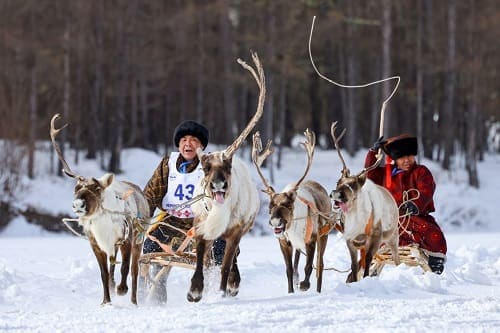Russia | India
The first International Traditional Reindeer Herding Championship was held in the Republic of Sakha (Yakutia) city of Neryungri and the village of Iyengra on 15-19 March. The event was attended by representatives of 14 regions of the Arctic and the Far East, China, Mongolia, Iceland, and Greenland, as well as the Russian Association of Indigenous Peoples of the North, the legislative authorities, and business, and members of the Association of World Reindeer Herders. The championship was held as part of the plan of events of Russia’s chairmanship of the Arctic Council in 2021-2023, which are managed by the Roscongress Foundation.
International Traditional Reindeer Herding Championship in Yakutia
“Reindeer herding is a major factor in preserving the way of life and culture of Indigenous peoples, as well as a link for many generations of residents of the Arctic regions. In addition, this craft is of great economic importance for local producers and allows them to remain in demand as suppliers on local food markets. In Russia, almost all Indigenous Peoples of the North, Siberia, and the Far East herd reindeer. There are more than 52,000 families of Indigenous peoples, many of whom lead a nomadic lifestyle,” said Nikolay Korchunov, Chair of the Senior Arctic Officials and Ambassador-at-Large for Arctic Cooperation of the Russian Ministry of Foreign Affairs.
The championship contestants competed in various types of competitions, including sled jumping, roping among men and women, a combined relay race, catching reindeer, as well as racing on reindeer sleds. In addition, competitions were held in professional Arctic skills, such as building a fire in winter, cooking fish soup on a fire, and dressing skins. The team of the Khanty-Mansi Autonomous District won the team event, while representatives of the Yamal-Nenets Autonomous District took second place, and the Republic of Sakha (Yakutia) finished third.
The International Conference ‘Sustainable Development of Reindeer Herding amidst Global Changes in the Arctic‘ was also held as part of the championship. Experts discussed strategies to develop reindeer herding, training, and public-private partnerships in this area. Participants in the conference’s plenary session discussed improvements to legislation and state support for reindeer herding, as well as collaboration with industrial companies.
In addition, the decision was taken during the conference to establish an eastern branch of the Association of World Reindeer Herders. “To continue the association’s work, an eastern branch needs to be established in Russia. I propose including 20 regions of the Russian Federation, as well as the People’s Republic of China and Mongolia in it,” Association of World Reindeer Herders President Sergey Kharyuchi said. The central office of the association’s eastern branch will be located in the Yamal-Nenets Autonomous District city of Salekhard. Nine other reindeer herding regions of the world located west of the Russian border will establish a western branch. Both branches will operate under the same charter.
A project to build the Unique Iengra ethno-tourist complex was also held during the championship. Construction will start this year on the basis of the Evenki community. The corresponding agreement was signed by representatives of the company Elgaugol, the Ministry of Agriculture of the Republic of Sakha (Yakutia), and the Istok community of Indigenous Peoples of the North. Construction costs are expected to amount to roughly RUB 130 million. Within five years of operation, the number of deer in the herd could double to up to 2,000.
The event was organized by the Association of World Reindeer Herders, the Ministry for the Development of the Russian Far East and the Arctic, the Government of the Republic of Sakha (Yakutia), and the Administration of the Neryungri District.
Russia is the chair of the Arctic Council in 2021-2023. One of Russia’s main priorities is to develop human capital in the region, including the Indigenous Peoples of the North. Russia devotes special attention to maintaining the sustainability and viability of the peoples of the North, promoting measures to adapt them to climate change, improving people’s well-being, health, education, and quality of life, and ensuring sustainable socioeconomic development throughout the region. The Russian side has initiated projects to digitalize the cultural and linguistic heritage of the Indigenous Peoples of the North, develop renewable energy sources, create an international Arctic research station that runs on carbon-free energy, and ensure biosecurity in the Arctic. In addition, Russia is preparing draft proposals on the traditional medicine of Indigenous Peoples and the development of creative industries in the Arctic, and is working on an initiative to create Digital Museums of the Arctic.

